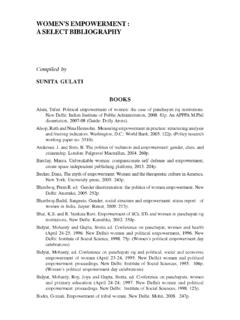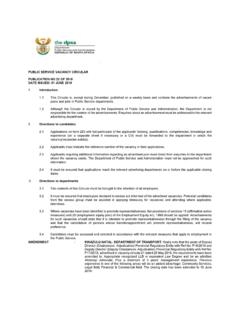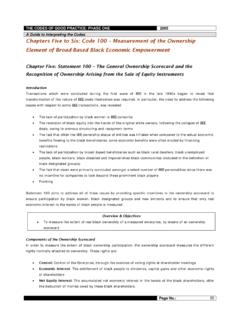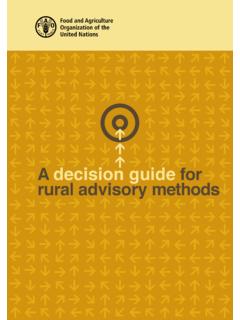Transcription of MAKING FINANCIAL DECISIONS - The Money Carer Foundation
1 MAKING FINANCIAL DECISIONSG uidance for Assessing, Supporting and Empowering Specific decision MakingEMPOWERMENT MATTERS23 ContentsAcknowledgements 7 empowerment Matters CIC 7 Scope of the guidance 7 Guide Reference Group 8 Introduction 9 Who is this guide for? 11 Purpose of the guide 12 Case scenarios 12 What s covered in this guide? 13 Mental Capacity Act 2005 14 Why may people lack capacity? 14 MCA principles 15 Principle 1 the presumption of capacity 17 Principle 2 helping someone to make a decision 18 Principle 3 the right to make an unwise decision 20 Principle 4 DECISIONS made on the person s behalf must be in their best interests 21 Principle 5 the least restrictive option 22 Assessing capacity 23 The capacity test 25 Assessing capacity to make FINANCIAL DECISIONS 27 Considerations before assessing capacity 30 Checklist before beginning the assessment 30 Supported decision MAKING 35 FINANCIAL Capacity and FINANCIAL Capability 36 Provide all relevant information along with what rights the person has 38 Explain what support can be offered 38 Understand the person s situation 384 Consider if practical help may be needed 39 Allow sufficient time for the person to make the decision 39Re-visit the decision on a regular basis 39
2 Capacity to choose who supports you with your finances 40 Location and environment 40 Timing 41 Communication 42 Props/scenarios 42 Culture, Spirituality & Values 43 Independence and autonomy 43 Benefits of a Money plan/ FINANCIAL passport 44 empowerment and Protection in relation to finances 45 Advocacy 46 Support from an advocate 46 FINANCIAL advocacy 49 Who should carry out a capacity assessment? 50 Professional involvement 53 Reasonable Belief 55 Preparing for a Capacity Assessment 56 The person s support network 56 Undue influence/coercion 56 Capacity and Executive functioning 56 Defining the decision (s) 59 Assessing Capacity 61 Assessing capacity flow chart 61 The ladder of assessing capacity 62 Preparation of questions and using open questions 63 Considerations for what assessment may be like for the person 645 Capacity Assessment for FINANCIAL decision - MAKING 65 Recording Assessments 78 Deputies/attorneys recording 78 Best Interests 79 Best interests checklist 80 Who can make best interests DECISIONS in relation to finances?
3 83 Attorneys (donee) appointed by a person (donor) 83 Deputies appointed by the court to manage a person s property and ( FINANCIAL ) affairs 87 Family carers, care workers and support workers. 90 Appointees 91 Mediation 91 Independent report/view 92 Safeguarding 93 Who is at risk from FINANCIAL abuse? 93 Support options to minimise risks 95 Concerns when coercion may be occurring 98 Deputies and attorneys misusing Money 98 Top tips/recommendations 100 Templates 103 Assessing Capacity Checklist 103 Capacity Assessment Template for assessing a person s capacity to manage aspects of their finances 104 Capacity Assessment Template for assessing a person s capacity for a specific FINANCIAL decision 120 Form for MAKING best interests DECISIONS 125 empowerment Matters survey 130 Useful Resources 13167 AcknowledgementsAn online survey was set up to find out the views from
4 Anyone who has an interest in the assessment of a person s capacity to make DECISIONS about their finances. Responses were received from people who came from a wide range of backgrounds. Their contributions were extremely valuable and highlighted many issues experienced when attempting to assess a person s capacity for FINANCIAL decision - MAKING . Many people offered their experiences in resolving issues and we are grateful to them for sharing these. Many are included in this draft guide was circulated for comment to a reference group made up of a wide range of people and organisations. We would like to thank those people for their time and Cowley & Sue LeeEmpowerment Matters CICS cope of the guidance The guidance focuses primarily on how to assess an individual s capacity in relation to FINANCIAL decision - MAKING and makes practical suggestions about supporting an individual to make specific FINANCIAL DECISIONS .
5 Most issues taken to the Court of Protection are FINANCIAL ones. There is an impression that decision specific capacity assessment in relation to FINANCIAL decision - MAKING is not well understood or practiced. Therefore there is a need, in particular, for better understanding of capacity assessment for FINANCIAL decision MAKING , through a practitioner guide. It should be noted that assessments undertaken prior to a court decision are not covered in this Reference Group Joseph Yow MCA & DoLS Lead Cambridgeshire County CouncilLucy Bonnerjea MCA & DoLS Department of HealthAlex Ruck Keene Barrister 39 Essex Street ChambersMeike Beckford FINANCIAL Advocate DOSH Ian Gunn Consultant Personal FINANCIAL Planning LtdTim Farmer Managing Director TSF Consultants LtdPhil Pomroy Project & Performance Cheshire East Council Manager Adult SafeguardingJason Marshall Best Interests AssessorDr Helen Newby
6 Specialist in Neuropsychology & Company Director Newby Psychological Services LtdJill Rankin Director of Adult Services St Elizabeth s Centre9 IntroductionThis guide was written by empowerment Matters a Community Interest Company that is a resource agency for the Mental Capacity Act and Advocacy. Much of our work focuses on Mental Capacity Act training for staff supporting individuals who may lack capacity to make some DECISIONS . It is our experience of hearing about the issues they face in their everyday work that has helped us to understand the need for this guide and what should be included. The guide was funded by the Department of HealthThe House of Lords enquiry into the Mental Capacity Act 2005 acknowledged the wide-spread support which the Act enjoys among stakeholders .1 The evidence submitted during the enquiry also highlighted that there is a need for better understanding in relation to empowering individuals, capacity assessments and supported decision - MAKING .
7 These concepts are very important when supporting individuals to make FINANCIAL DECISIONS . There is a need for a practical guide that will assist those concerned with assessing an individual s capacity to manage their finances. FINANCIAL DECISIONS can range from deciding whether or not to buy a pint of milk to MAKING complex DECISIONS about a portfolio of shares. It is an area that demands a number of skills from the individual. People who support individuals may be concerned about the need to protect an individual so that their vulnerability to FINANCIAL abuse is minimised and this can sometimes result in a person not being supported to make their own FINANCIAL DECISIONS . It has the potential to disempower the individual. There is a need to balance safeguarding the person from FINANCIAL abuse with the need to preserve the individual s survey highlighted the concern that sometimes a blanket decision that an individual lacks capacity to manage all their finances is applied without any regard to whether the 1 Mental Capacity Act 2005 post-legislative scrutiny.
8 House of Lords Select Committee on the Mental Capacity Act 2005 (2014) has capacity to manage a particular aspect of their finances. Family members, deputies and attorneys may take on the responsibility of managing a person s finances with the assumption that an individual is incapable of MAKING ANY FINANCIAL DECISIONS . This is contrary to the Mental Capacity Act that places emphasis on enablement and is the ability to make a particular decision , having understood the information relating to the decision at hand and appreciating the consequence of MAKING or not MAKING that decision . In order to provide the right support and to respect the rights of the individual it is essential that the person s capacity to make particular DECISIONS about their finances is properly assessed. It is possible, for example, for someone to lack capacity to make DECISIONS about paying rent and bills but to have capacity to make DECISIONS about buying everyday items MAKING it necessary to assess capacity in relation to specific FINANCIAL is this guide for?
9 This guide is primarily for anyone who is in a position of assessing and/or supporting an individual to manage their own finances including: Support and care staff involved in supporting and empowering individuals in their own homes or in a care setting. Deputies and their staff appointed by the court to manage a person s property and affairs such as those employed by a solicitors firm or a local authority. Deputies appointed by the court to manage a person s property and affairs who are a family member or a friend. Appointees who are appointed by the Department for Work and Pensions to claim and collect benefits or pensions on behalf of a person who lacks capacity to manage their own benefits. Attorneys who are appointed to make DECISIONS about property and affairs under a Lasting Power of Attorney (LPA). Staff working in the banking sector. Family carers and friends who support an individual with their finances.
10 Advocates who are involved in supporting a person to understand their options in relation to their finances or involved in a non-instructed capacity when DECISIONS about finances are being made by others. Social workers and Care Managers who have a responsibility to assess capacity and to put in place appropriate support when a person is found to lack capacity to manage some or all aspects of their FINANCIAL affairs GPs who may be asked to assess someone s capacity to manage their finances, for example, in support of a person s application to appoint a Property and Affairs Attorney for a Lasting Power of Attorney. Trainers who deliver training on the Mental Capacity Act may also find this guidance of the guideThe guide provides practical assistance to anyone who supports an individual to make DECISIONS about their finances. It is necessary to include the legislation that governs FINANCIAL decision - MAKING and a small part of the guide is devoted to that important aspect, however, this is above all a guide that makes practical suggestions about how to: empower and support an individual with MAKING DECISIONS about their finances assess an individual s capacity in relation to FINANCIAL decision - MAKING in a way which is decision -specific apply the Mental Capacity Act to an individual s situation enable decision MAKING by individuals wherever possibleIt sets out to promote best practice in this is a complex area and the guide cannot cover every conceivable situation or decision that individuals may face.





